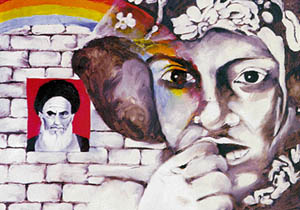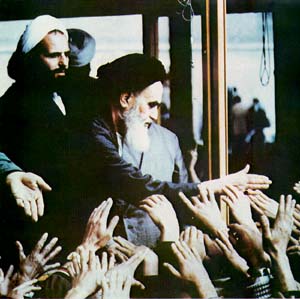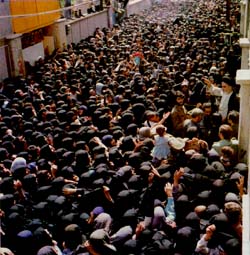Taken from a speech by Tina Conlon,
a Christian Lay-Minister from Canada, given during the
9th anniversary commemoration of the passing of Imam Khomeini.
[Courtesy al-Haqq Newsletter, Vol5 Issue7]

I greet you all, brothers and sisters in Islam, as a Christian
and a follower of Jesus' example and teachings, and as
a reader of Scriptures. According to Imam Khomeini, Jesus
was appointed by God to support the oppressed and establish
justice and mercy. The Imam further said that Jesus' divinely
inspired words and angelic deeds condemned oppressors
and tyrants and support the oppressed, deprived and abased
people.
Sixteen years ago, when the man who I eventually
married asked me what I thought about the Ayatollah Khomeini,
my response was based on ignorance. I was informed only
by what I read in the papers. I told him that any man who
could strike fear in the heart of the president of the most
powerful country in the world is someone we should pay attention
to. I told him that I admire the leader of the Islamic Revolution
and wanted to know more about him. Six months later, we
were married. It is good to marry the person you have agreements
with on these matters.
I was asked to speak on the Imam's message about the struggle
of Muslims and Christians against oppression. In Christmas
in 1978, I was still a student at a seminary in training
to be a minister in a Christian church. I read the Bible
and discuss matters of theology with my classmates. We learned,
or tried to learn, about what its like to be a clergy to
a world which is increasingly turning back on God. At that
time, Iranian youths held hostage a group of people who
were caught in espionage, an act which in the western world
could get automatic execution. These youth demanded that
in exchange for the spies Carter hand over the deposed Shah
of Iran. My classmates and I waited with bated breath to
see what conditions these captives were in. We knew about
other incidents in El Salvador, in Guatemala, in the Philippines
and even in the USA where captives were often tortured,
have lost limbs, and were unable to carry on a normal life
if they survived their capture. Instead, we saw these captives
released healthy, if not healthier than they were before
they were taken hostage. Imam Khomeini said that the youths
treated the spies fairly because Islam commands one to have
mercy upon captives, even if they are oppressors or spies.

As one who reads the Bible, I was very impressed by that
remark. The Bible speaks of justice to the oppressed, comfort
to the sick and commands us to show kindness to those who
are imprisoned. The Imam showed more charity, more concern
for others than those who were supposed to be but just apparently-Christian.
President Carter prayed for the success of his mission.
He demanded that church bells ring throughout America. The
leader of the Islamic Revolution prayed to Allah, for the
deprived nations whose existence has fallen under the boots
of the powerful oppressors. The irony was that the president
of the USA and the leader of the Islamic Republic were not
praying to two different Gods. This was not a contest of
whose God was better. Each recognized that their God is
One God. There is only one God and God is not on the side
of the oppressors.
The brother asked me to speak about the unity of Muslims
and Christians and establishing a God-fearing government
on the Earth. Imam Khomeini, may peace be upon his name,
not only cried for justice for the massacres in Iran but
also for the massacres in Vietnam, in Palestine, in Lebanon
and in many other places. I have been to many demonstrations.
In them, we speak out against the injustices of the oppressors.
We denounced their acts and demand some action. In the Zionist
bombing of Sabra and Shatilla, I joined Muslim brothers
and sisters in demonstrating in front of the US Embassy.
As we marched in front of the US Embassy, I was the happiest,
the proudest Christian, to march alongside a group of people
whose battle cry was simply, "Allahu Akbar GOD IS GREAT."
Some people who recognized me at the seminary where I was
a student admonished me from joining the march. One of my
classmates said that I was joining the fight of non-Christians
. "No", I said, I am marching with those who say that "GOD
IS GREAT!" and you know what, I agree. Some of the sisters
who heard the exchange laughed with me and they took a piece
of cloth to cover my head. "See," she said, "you are one
of us now." I pulled the cloth over my head, smiled at her
and agreed. I looked back at the line, I noticed that the
classmate who admonished me pick up a placard and he began
chanting as well, "GOD IS GREAT".

The Imam's cause was not only to support the cause of
Iranians, nor only of Islam. His cause was to bring God's
justice among those who are oppressed. The Palestinians
were not all Muslims. Yet the Imam embraced their cause
for justice against their oppressors as though it was his
own cause. And it was.
The Imam also championed the cause of the Black people
of South Africa in their struggle against Apartheid. Yes,
there are Muslims in South Africa. But there are also Jews,
Christians and people of many different faiths. Nelson Mandela
is not a Muslim and yet when the Imam embraced him like
a brother and made his struggle his own. He did not falter,
hesitate or hold back. He gave his support in fighting the
racist regime, because God is on the side of the oppressed.
The Imain wrote in one of his testaments, My advice to
all Muslims and oppressed people of the world is this: you
should not sit and wait till your own authorities or rulers,
or some foreign power act to make a gift of freedom and
independence to you. During the past one hundred years we
have observed the infiltration of the world's major powers
into all Islamic countries and into smaller lands. ...None
of the rulers of any of these countries has been concerned
with freedom, independence and the welfare of his nation,
and none is even today. Rather the majority of such rulers
have been themselves cruel oppressors who tried to strangulate
their own people. Whatever good they did was to benefit
themselves or was in the interest of some special group
or, such rulers, promoted by the welfare of the upper already
well-to-do classes but never did a thing to benefit the
deprived groups and slum-dwellers.... [They] turned their
countries into markets for the consumption of the manufactured
products of their overlords, kept their own lands in an
undeveloped conditions, and are doing so even now."
 "O
Mustazafeen (deprived, oppressed) of the world! O Muslims
and Muslim countries of the world! Arise and wrest your
rights by your teeth and fingernails! ... Drive out from
your lands your wicked rulers who hand over your wages to
your enemies and the enemies of Islam. Yourselves and the
dedicated public servants should take charge of the affairs
of your country. Gather all of you under the proud banner
of Islam and fight the enemies of Islam and the deprived
people of the world. Advance toward an Islamic sovereign
government with so many free and independent republics.
If you realize this, the arrogant powers shall retreat to
their rightful positions and all the Mustazafeen will come
to inherit the earth and attain to guardianship over it.
Look forward to the day when God's promise shall be fulfilled." "O
Mustazafeen (deprived, oppressed) of the world! O Muslims
and Muslim countries of the world! Arise and wrest your
rights by your teeth and fingernails! ... Drive out from
your lands your wicked rulers who hand over your wages to
your enemies and the enemies of Islam. Yourselves and the
dedicated public servants should take charge of the affairs
of your country. Gather all of you under the proud banner
of Islam and fight the enemies of Islam and the deprived
people of the world. Advance toward an Islamic sovereign
government with so many free and independent republics.
If you realize this, the arrogant powers shall retreat to
their rightful positions and all the Mustazafeen will come
to inherit the earth and attain to guardianship over it.
Look forward to the day when God's promise shall be fulfilled."
Almost fifty years ago, world leaders signed a global
charter declaring people's basic human rights, in Oxfam
Canada, the organization I am currently working for, is
collecting signatures to remind the global leaders of the
commitments they signed to:
That people are able to enjoy the following universal
human rights: enough to eat, clean water, a home, health
care, education, a livelihood, protection from violence,
equality of opportunity and a say in the future. While these
rights have been declared universal, we stand in recognition
of their vulnerability to those who hold power in the world.
We observe how a powerful country's resolve to draw sanctions
against can endanger that country's ability to provide its
citizens with their basic human rights. At times, that resolve
meant the abdication of responsibility even to their own
citizens.
I still do not know much about the Imam Khomeini, but
I have learned much from sixteen years ago. I consider him
one of my spiritual leaders. He championed the cause of
God against oppression. He fought the oppression for the
people of Iran who suffered hardship under the tyranny of
the Shah. He fought the oppression of the Black people of
South Africa against the oppressive Apartheid. He fought
the oppression of the Palestinians who until now are not
protected from violence, after simply trying to regain their
right to a home.
Salaam, May peace be unto you.
|
